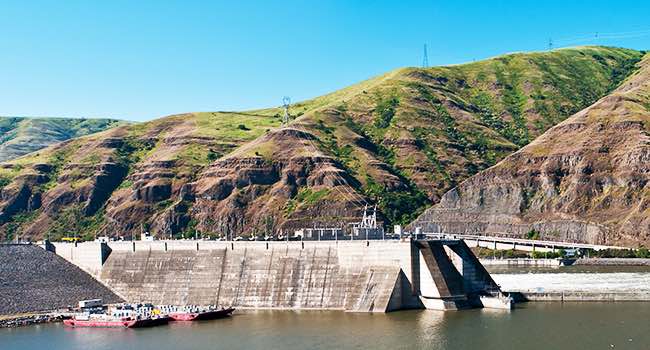the film
forum
library
tutorial
contact
|

|
Gov. Brown: Breach the Snake River Dams, But First
Provide Ag, Community and Renewable Power Infrastructure
by Ellen Bishop
Capital Press, February 17, 2020
|
"The science is clear that removing the earthen portions of the four Lower Snake River Dams
is the most certain and robust solution to Snake River salmon and steelhead recovery."
 In a letter widely interpreted as a clarion call for the breaching of the four lower Snake River dams, Oregon Gov. Kate Brown called for improvements to support communities, agriculture and renewable power sources before removing the earthen portions of the four Lower Snake River dams.
"The science is clear that removing the earthen portions of the four Lower Snake River Dams is the most certain and robust solution to Snake River salmon and steelhead recovery," the Feb. 11 letter to Wash. Gov. Jay Inslee stated. "This option reduces direct and delayed mortality of wild and hatchery salmon associated with the dam and reservoir passage and provides the most resilience to climate change. ..."
In a letter widely interpreted as a clarion call for the breaching of the four lower Snake River dams, Oregon Gov. Kate Brown called for improvements to support communities, agriculture and renewable power sources before removing the earthen portions of the four Lower Snake River dams.
"The science is clear that removing the earthen portions of the four Lower Snake River Dams is the most certain and robust solution to Snake River salmon and steelhead recovery," the Feb. 11 letter to Wash. Gov. Jay Inslee stated. "This option reduces direct and delayed mortality of wild and hatchery salmon associated with the dam and reservoir passage and provides the most resilience to climate change. ..."
But she continued: "Much must be done before this is accomplished in order to help minimize and mitigate for potential harm to other sectors." Those tasks include "an affordable, nimble power system .... Continued water supplies for agriculture and municipalities; and efficient, and affordable ways to get commodities to market."
Brown's letter was written in response to the recent draft report on public opinions about the dams produced by Inslee's office. Key public concerns in that report included the need for infrastructure to transport large volumes of grain to market, provide irrigation and support for crop production, and to replace the power generated by the dams. It also expressed Oregon's support for providing adequate food (i.e. salmonids) for the undernourished Southern Resident Orcas whose decline was addressed in the Inslee report.
In her letter, Brown offered to "... increase interim hatchery production of salmon important for orca forage," in places such as the Lower Columbia that are "outside native salmon's "natural production areas."
She also touted moving forward on the Flexible Spill and Power Agreement" signed by both Oregon and Washington in late 2018. The agreement calls for flexible spill operations that meet three objectives: provide additional fish benefits by increasing spill; manage power system costs and preserve hydro system flexibility; and retain operational feasibility. Specifically, these operations involve increased spill during certain times of the day for fish migration and lesser amounts for the hours when hydropower production is needed most, according to a joint statement by the signatories.
Brown's letter has stirred concern among the eastern Washington congressional delegation. In a joint statement Friday afternoon, Republican Reps. Dan Newhouse, Cathy McMorris Rodgers and Jaime Herrera Beutler, said, "Gov. Brown's position is not only misguided, it is shocking and extreme."
Jim Harbeck, head of the Nez Perce Fisheries office in Joseph, said "The Nez Peace tribe has been in favor of breaching the dams for years and was one of the first to call for their removal. Now there are increasing voices calling for removal, and mounting support."
Brown's letter stated, "As identified in your draft report, collaborative, solutions based discussions among stakeholders are needed to facilitate these discussions. Oregon stands ready to be an effective leader and partner in these efforts."
Ellen Bishop
Gov. Brown: Breach the Snake River Dams, But First Provide Ag, Community and Renewable Power Infrastructure
Capital Press, February 17, 2020
See what you can learn
learn more on topics covered in the film
see the video
read the script
learn the songs
discussion forum


 In a letter widely interpreted as a clarion call for the breaching of the four lower Snake River dams, Oregon Gov. Kate Brown called for improvements to support communities, agriculture and renewable power sources before removing the earthen portions of the four Lower Snake River dams.
"The science is clear that removing the earthen portions of the four Lower Snake River Dams is the most certain and robust solution to Snake River salmon and steelhead recovery," the Feb. 11 letter to Wash. Gov. Jay Inslee stated. "This option reduces direct and delayed mortality of wild and hatchery salmon associated with the dam and reservoir passage and provides the most resilience to climate change. ..."
In a letter widely interpreted as a clarion call for the breaching of the four lower Snake River dams, Oregon Gov. Kate Brown called for improvements to support communities, agriculture and renewable power sources before removing the earthen portions of the four Lower Snake River dams.
"The science is clear that removing the earthen portions of the four Lower Snake River Dams is the most certain and robust solution to Snake River salmon and steelhead recovery," the Feb. 11 letter to Wash. Gov. Jay Inslee stated. "This option reduces direct and delayed mortality of wild and hatchery salmon associated with the dam and reservoir passage and provides the most resilience to climate change. ..."
